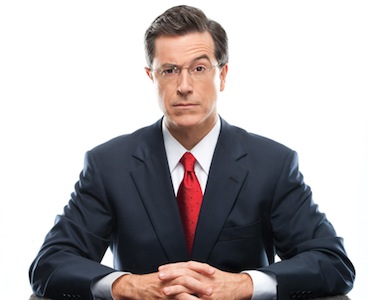Virtually every new TV show reminds me that I do not belong to a coveted target audience, and that the white male perspective is still considered universally applicable.
Last Thursday, news that CBS had picked Stephen Colbert to be the next host of “The Late Show” swept through social media. While some expressed excitement about the comedic faux-conservative news anchor’s move to mainstream broadcast TV, others were disappointed at the selection of yet another white guy to fill the major time slot.
But me? Well, I’ve got to be honest: I just don’t care.
Don’t get me wrong. I understand the importance of representation on television. News stories about women frequently perpetuate social myths about gender. Studies also show that whites’ perceptions and opinions of blacks mirror media representations, and the media functions as a major social learning vehicle by which whites learn about people of color.
In other words—when the black person on your TV screen is the guy you chuckle with at the end of a long day rather than a gun-toting gang member, your opinion of black guys might change. And you might not cross the street the next time you see a black dude approaching you during a leisurely stroll (or, at least, you might not cross the street quite as often). Seeing women and people of color on television does indeed matter, even as their marginalization on TV programs continues to pose a significant challenge.
That especially includes late night TV. Just last month, Arsenio Hall made headlines when he very publicly complained about being left out of an NBC news report about late night talk show hosts (for which news anchor and host Brian Williams later apologized).
But the glaring omission reminded everyone of what should’ve already been blatantly obvious: Late night TV is still very white and very male.
Would I love to see a woman host? Or a person of color? Do I think that the Roots should have the option of working for a black guy, and not just a white guy who likes hanging out with black people?
Sure.
But did you really think that Wanda Sykes was going to be the next host of “The Late Show”? Really?
Let’s be honest: TV is white. In the Obama era, it sometimes seems like television has gone out of its way to assure everyone that white folks are still in charge. Just a cursory glance at some of the most popular and highly acclaimed shows makes that clear. There’s (white) “Girls,” “Mad Men,” “Game of Thrones,” “Breaking Bad,” and the list goes on. Virtually every new TV show reminds me that I do not belong to a coveted target audience and that the white male perspective is still considered universally applicable.
And it doesn’t make any sense. Despite with his progressive politics, being a straight white male makes Colbert seem like a safe, albeit edgy, bet. Even conservative columnist Kathleen Parker thinks he’ll be good for “Heartland Americans.” But, as Northwestern professor Aymar Jean Christian points out, “This is actually the perfect time for networks to experiment and try new things because the TV landscape is so changed. There’s a good chance that they’d get more viewers if they tried something new. There’s really no reason that these programs should be all white except for white supremacy.”
When asked about choosing a more diverse candidate, CBS entertainment executive Nina Tassler explained “His name just stood out above everybody else.” Everybody.
In reality, getting marginalized people access to these types of opportunities takes a long period of investment. Take Stephen Colbert for example. His big break came as a regular character and correspondent on the Jon Stewart show. And, with Stewart’s full financial support and backing, Colbert launched his own successful late night cable program. He’s worked hard and “The Late Show” will probably be a great show with him at the helm, but along the way, he’s routinely been given opportunities that women and people of color rarely receive. When people argue that there is a dearth of diverse talent available for positions like a “Late Show” host, it’s generally because no such talent was cultivated.
And even when they happen to make it to the TV apex, women and people of color are frequently under-compensated (like Kerry Washington), given fewer resources, or presented as evidence for the viability of whatever demographic they’re supposed to represent. Do you remember when Magic Johnson, the Wayans Brothers, and Sinbad each had their own late night shows? Trust me, TV executives still do.
So, while I send my congratulations to Colbert, I am decidedly unmoved by his selection. While the country’s demographics might be changing, TV is slow to respond. Though it might be infuriating (or exhilarating) for some, it’s just old faux-news to me.
Khadijah Costley White is a faculty member in the Department of Journalism and Media Studies at Rutgers University in New Brunswick. Find her on Twitter here.
Related Links:

